IT Ethics: Exploring Ethical Issues of AI and Robotics in Employment
VerifiedAdded on 2020/03/28
|6
|1795
|72
Essay
AI Summary
This essay delves into the ethical issues surrounding the implementation of AI and robots in the workplace, particularly focusing on the potential displacement of human workers. It begins with an introduction highlighting the concerns raised by the automation of the workforce, referencing case studies of companies such as Foxconn and Amazon. The core of the essay involves a critical review of the ethical issues from the perspective of classical ethical theories, including Deontology, Utilitarianism, Contract theory, and Virtue theory. Deontology is explored through the lens of categorical imperatives, while Utilitarianism is examined in terms of both act and rule utilitarianism. The essay also analyzes the role of Virtue theory and Contract theory in addressing the ethical dilemmas of AI-driven automation. Examples of companies that have successfully integrated AI while retraining their human workforce are included, and the essay concludes by synthesizing the insights gained from each ethical perspective to offer recommendations for resolving the ethical challenges posed by AI in the context of employment.
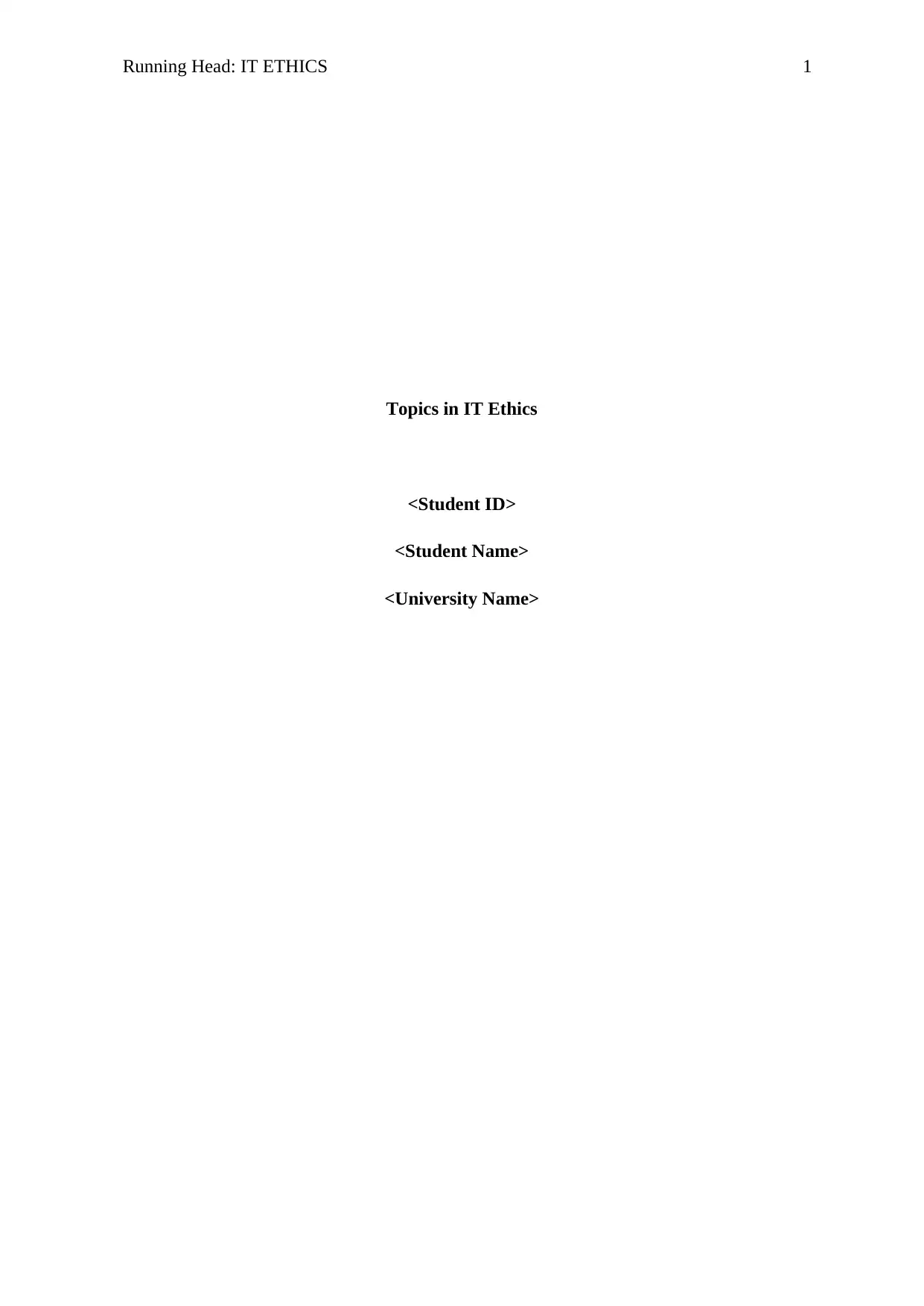
Running Head: IT ETHICS 1
Topics in IT Ethics
<Student ID>
<Student Name>
<University Name>
Topics in IT Ethics
<Student ID>
<Student Name>
<University Name>
Paraphrase This Document
Need a fresh take? Get an instant paraphrase of this document with our AI Paraphraser
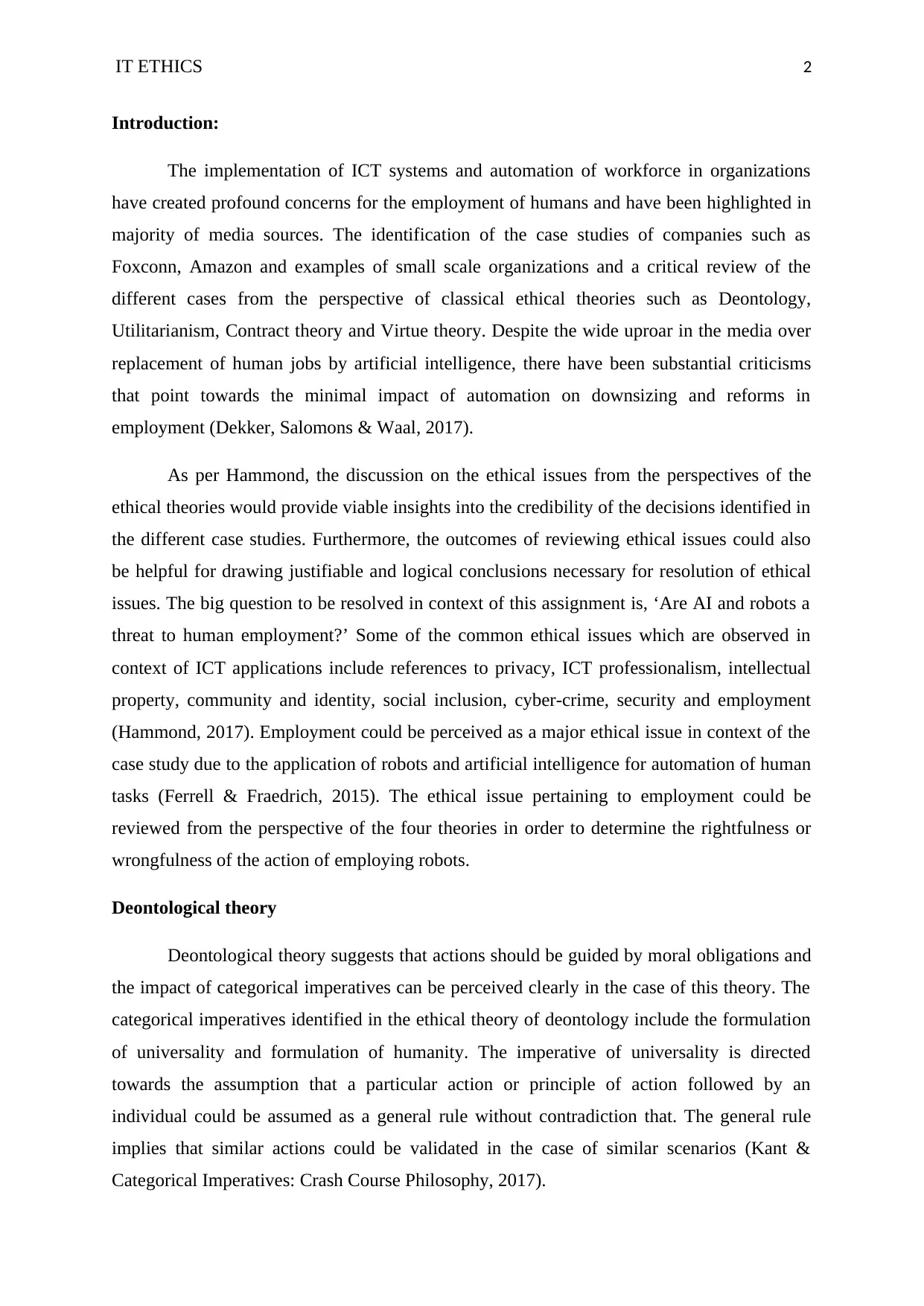
IT ETHICS 2
Introduction:
The implementation of ICT systems and automation of workforce in organizations
have created profound concerns for the employment of humans and have been highlighted in
majority of media sources. The identification of the case studies of companies such as
Foxconn, Amazon and examples of small scale organizations and a critical review of the
different cases from the perspective of classical ethical theories such as Deontology,
Utilitarianism, Contract theory and Virtue theory. Despite the wide uproar in the media over
replacement of human jobs by artificial intelligence, there have been substantial criticisms
that point towards the minimal impact of automation on downsizing and reforms in
employment (Dekker, Salomons & Waal, 2017).
As per Hammond, the discussion on the ethical issues from the perspectives of the
ethical theories would provide viable insights into the credibility of the decisions identified in
the different case studies. Furthermore, the outcomes of reviewing ethical issues could also
be helpful for drawing justifiable and logical conclusions necessary for resolution of ethical
issues. The big question to be resolved in context of this assignment is, ‘Are AI and robots a
threat to human employment?’ Some of the common ethical issues which are observed in
context of ICT applications include references to privacy, ICT professionalism, intellectual
property, community and identity, social inclusion, cyber-crime, security and employment
(Hammond, 2017). Employment could be perceived as a major ethical issue in context of the
case study due to the application of robots and artificial intelligence for automation of human
tasks (Ferrell & Fraedrich, 2015). The ethical issue pertaining to employment could be
reviewed from the perspective of the four theories in order to determine the rightfulness or
wrongfulness of the action of employing robots.
Deontological theory
Deontological theory suggests that actions should be guided by moral obligations and
the impact of categorical imperatives can be perceived clearly in the case of this theory. The
categorical imperatives identified in the ethical theory of deontology include the formulation
of universality and formulation of humanity. The imperative of universality is directed
towards the assumption that a particular action or principle of action followed by an
individual could be assumed as a general rule without contradiction that. The general rule
implies that similar actions could be validated in the case of similar scenarios (Kant &
Categorical Imperatives: Crash Course Philosophy, 2017).
Introduction:
The implementation of ICT systems and automation of workforce in organizations
have created profound concerns for the employment of humans and have been highlighted in
majority of media sources. The identification of the case studies of companies such as
Foxconn, Amazon and examples of small scale organizations and a critical review of the
different cases from the perspective of classical ethical theories such as Deontology,
Utilitarianism, Contract theory and Virtue theory. Despite the wide uproar in the media over
replacement of human jobs by artificial intelligence, there have been substantial criticisms
that point towards the minimal impact of automation on downsizing and reforms in
employment (Dekker, Salomons & Waal, 2017).
As per Hammond, the discussion on the ethical issues from the perspectives of the
ethical theories would provide viable insights into the credibility of the decisions identified in
the different case studies. Furthermore, the outcomes of reviewing ethical issues could also
be helpful for drawing justifiable and logical conclusions necessary for resolution of ethical
issues. The big question to be resolved in context of this assignment is, ‘Are AI and robots a
threat to human employment?’ Some of the common ethical issues which are observed in
context of ICT applications include references to privacy, ICT professionalism, intellectual
property, community and identity, social inclusion, cyber-crime, security and employment
(Hammond, 2017). Employment could be perceived as a major ethical issue in context of the
case study due to the application of robots and artificial intelligence for automation of human
tasks (Ferrell & Fraedrich, 2015). The ethical issue pertaining to employment could be
reviewed from the perspective of the four theories in order to determine the rightfulness or
wrongfulness of the action of employing robots.
Deontological theory
Deontological theory suggests that actions should be guided by moral obligations and
the impact of categorical imperatives can be perceived clearly in the case of this theory. The
categorical imperatives identified in the ethical theory of deontology include the formulation
of universality and formulation of humanity. The imperative of universality is directed
towards the assumption that a particular action or principle of action followed by an
individual could be assumed as a general rule without contradiction that. The general rule
implies that similar actions could be validated in the case of similar scenarios (Kant &
Categorical Imperatives: Crash Course Philosophy, 2017).
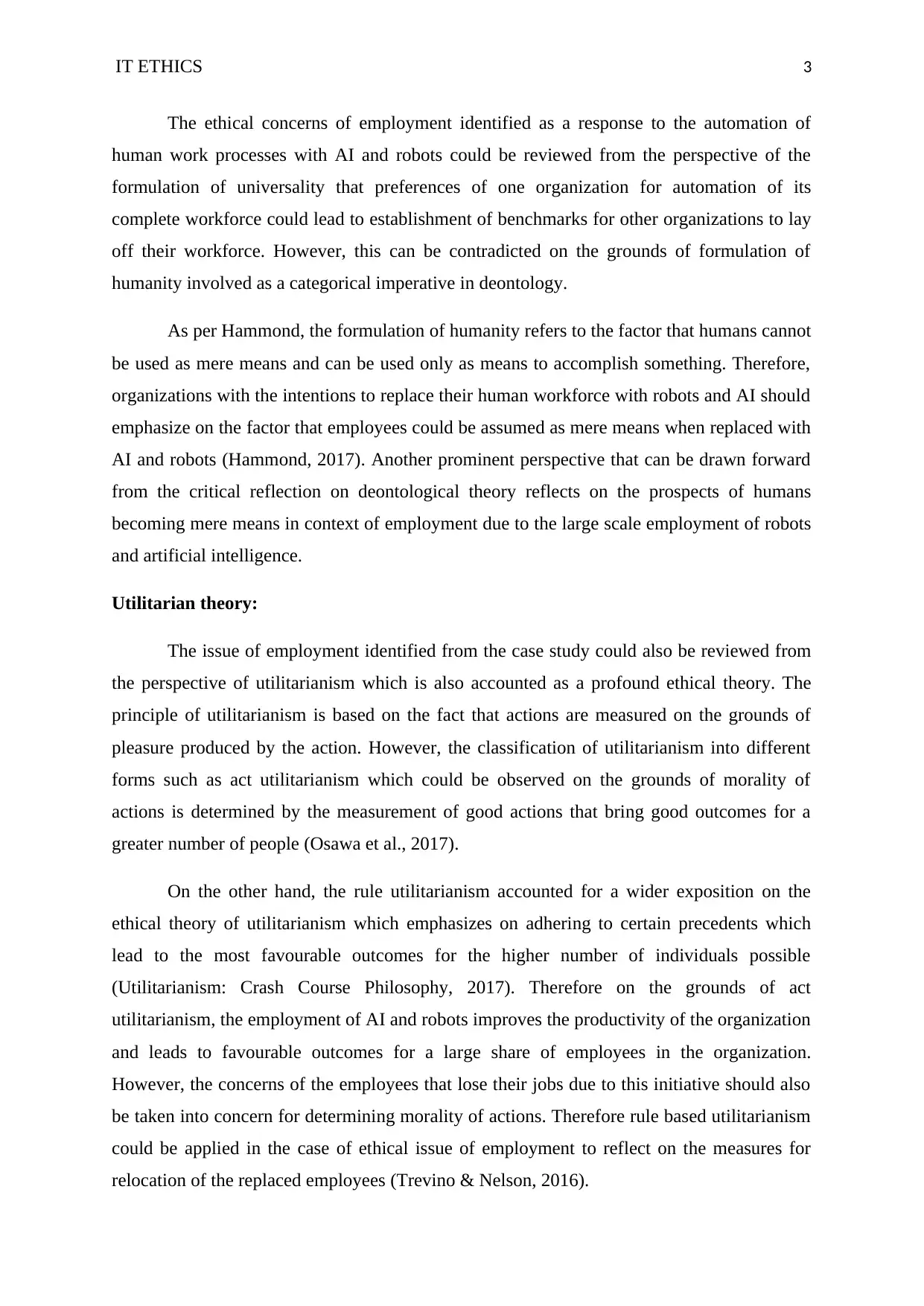
IT ETHICS 3
The ethical concerns of employment identified as a response to the automation of
human work processes with AI and robots could be reviewed from the perspective of the
formulation of universality that preferences of one organization for automation of its
complete workforce could lead to establishment of benchmarks for other organizations to lay
off their workforce. However, this can be contradicted on the grounds of formulation of
humanity involved as a categorical imperative in deontology.
As per Hammond, the formulation of humanity refers to the factor that humans cannot
be used as mere means and can be used only as means to accomplish something. Therefore,
organizations with the intentions to replace their human workforce with robots and AI should
emphasize on the factor that employees could be assumed as mere means when replaced with
AI and robots (Hammond, 2017). Another prominent perspective that can be drawn forward
from the critical reflection on deontological theory reflects on the prospects of humans
becoming mere means in context of employment due to the large scale employment of robots
and artificial intelligence.
Utilitarian theory:
The issue of employment identified from the case study could also be reviewed from
the perspective of utilitarianism which is also accounted as a profound ethical theory. The
principle of utilitarianism is based on the fact that actions are measured on the grounds of
pleasure produced by the action. However, the classification of utilitarianism into different
forms such as act utilitarianism which could be observed on the grounds of morality of
actions is determined by the measurement of good actions that bring good outcomes for a
greater number of people (Osawa et al., 2017).
On the other hand, the rule utilitarianism accounted for a wider exposition on the
ethical theory of utilitarianism which emphasizes on adhering to certain precedents which
lead to the most favourable outcomes for the higher number of individuals possible
(Utilitarianism: Crash Course Philosophy, 2017). Therefore on the grounds of act
utilitarianism, the employment of AI and robots improves the productivity of the organization
and leads to favourable outcomes for a large share of employees in the organization.
However, the concerns of the employees that lose their jobs due to this initiative should also
be taken into concern for determining morality of actions. Therefore rule based utilitarianism
could be applied in the case of ethical issue of employment to reflect on the measures for
relocation of the replaced employees (Trevino & Nelson, 2016).
The ethical concerns of employment identified as a response to the automation of
human work processes with AI and robots could be reviewed from the perspective of the
formulation of universality that preferences of one organization for automation of its
complete workforce could lead to establishment of benchmarks for other organizations to lay
off their workforce. However, this can be contradicted on the grounds of formulation of
humanity involved as a categorical imperative in deontology.
As per Hammond, the formulation of humanity refers to the factor that humans cannot
be used as mere means and can be used only as means to accomplish something. Therefore,
organizations with the intentions to replace their human workforce with robots and AI should
emphasize on the factor that employees could be assumed as mere means when replaced with
AI and robots (Hammond, 2017). Another prominent perspective that can be drawn forward
from the critical reflection on deontological theory reflects on the prospects of humans
becoming mere means in context of employment due to the large scale employment of robots
and artificial intelligence.
Utilitarian theory:
The issue of employment identified from the case study could also be reviewed from
the perspective of utilitarianism which is also accounted as a profound ethical theory. The
principle of utilitarianism is based on the fact that actions are measured on the grounds of
pleasure produced by the action. However, the classification of utilitarianism into different
forms such as act utilitarianism which could be observed on the grounds of morality of
actions is determined by the measurement of good actions that bring good outcomes for a
greater number of people (Osawa et al., 2017).
On the other hand, the rule utilitarianism accounted for a wider exposition on the
ethical theory of utilitarianism which emphasizes on adhering to certain precedents which
lead to the most favourable outcomes for the higher number of individuals possible
(Utilitarianism: Crash Course Philosophy, 2017). Therefore on the grounds of act
utilitarianism, the employment of AI and robots improves the productivity of the organization
and leads to favourable outcomes for a large share of employees in the organization.
However, the concerns of the employees that lose their jobs due to this initiative should also
be taken into concern for determining morality of actions. Therefore rule based utilitarianism
could be applied in the case of ethical issue of employment to reflect on the measures for
relocation of the replaced employees (Trevino & Nelson, 2016).
⊘ This is a preview!⊘
Do you want full access?
Subscribe today to unlock all pages.

Trusted by 1+ million students worldwide
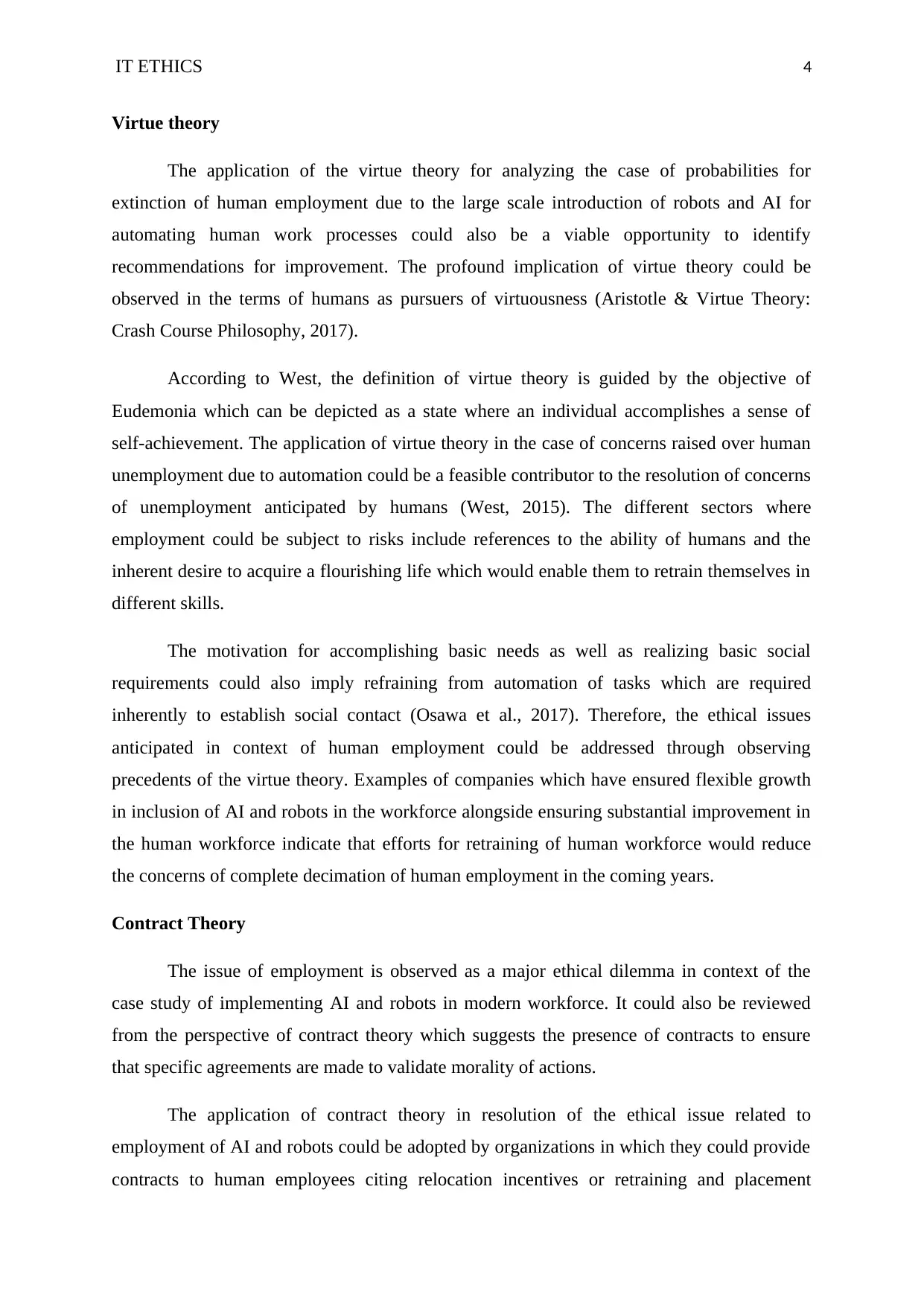
IT ETHICS 4
Virtue theory
The application of the virtue theory for analyzing the case of probabilities for
extinction of human employment due to the large scale introduction of robots and AI for
automating human work processes could also be a viable opportunity to identify
recommendations for improvement. The profound implication of virtue theory could be
observed in the terms of humans as pursuers of virtuousness (Aristotle & Virtue Theory:
Crash Course Philosophy, 2017).
According to West, the definition of virtue theory is guided by the objective of
Eudemonia which can be depicted as a state where an individual accomplishes a sense of
self-achievement. The application of virtue theory in the case of concerns raised over human
unemployment due to automation could be a feasible contributor to the resolution of concerns
of unemployment anticipated by humans (West, 2015). The different sectors where
employment could be subject to risks include references to the ability of humans and the
inherent desire to acquire a flourishing life which would enable them to retrain themselves in
different skills.
The motivation for accomplishing basic needs as well as realizing basic social
requirements could also imply refraining from automation of tasks which are required
inherently to establish social contact (Osawa et al., 2017). Therefore, the ethical issues
anticipated in context of human employment could be addressed through observing
precedents of the virtue theory. Examples of companies which have ensured flexible growth
in inclusion of AI and robots in the workforce alongside ensuring substantial improvement in
the human workforce indicate that efforts for retraining of human workforce would reduce
the concerns of complete decimation of human employment in the coming years.
Contract Theory
The issue of employment is observed as a major ethical dilemma in context of the
case study of implementing AI and robots in modern workforce. It could also be reviewed
from the perspective of contract theory which suggests the presence of contracts to ensure
that specific agreements are made to validate morality of actions.
The application of contract theory in resolution of the ethical issue related to
employment of AI and robots could be adopted by organizations in which they could provide
contracts to human employees citing relocation incentives or retraining and placement
Virtue theory
The application of the virtue theory for analyzing the case of probabilities for
extinction of human employment due to the large scale introduction of robots and AI for
automating human work processes could also be a viable opportunity to identify
recommendations for improvement. The profound implication of virtue theory could be
observed in the terms of humans as pursuers of virtuousness (Aristotle & Virtue Theory:
Crash Course Philosophy, 2017).
According to West, the definition of virtue theory is guided by the objective of
Eudemonia which can be depicted as a state where an individual accomplishes a sense of
self-achievement. The application of virtue theory in the case of concerns raised over human
unemployment due to automation could be a feasible contributor to the resolution of concerns
of unemployment anticipated by humans (West, 2015). The different sectors where
employment could be subject to risks include references to the ability of humans and the
inherent desire to acquire a flourishing life which would enable them to retrain themselves in
different skills.
The motivation for accomplishing basic needs as well as realizing basic social
requirements could also imply refraining from automation of tasks which are required
inherently to establish social contact (Osawa et al., 2017). Therefore, the ethical issues
anticipated in context of human employment could be addressed through observing
precedents of the virtue theory. Examples of companies which have ensured flexible growth
in inclusion of AI and robots in the workforce alongside ensuring substantial improvement in
the human workforce indicate that efforts for retraining of human workforce would reduce
the concerns of complete decimation of human employment in the coming years.
Contract Theory
The issue of employment is observed as a major ethical dilemma in context of the
case study of implementing AI and robots in modern workforce. It could also be reviewed
from the perspective of contract theory which suggests the presence of contracts to ensure
that specific agreements are made to validate morality of actions.
The application of contract theory in resolution of the ethical issue related to
employment of AI and robots could be adopted by organizations in which they could provide
contracts to human employees citing relocation incentives or retraining and placement
Paraphrase This Document
Need a fresh take? Get an instant paraphrase of this document with our AI Paraphraser
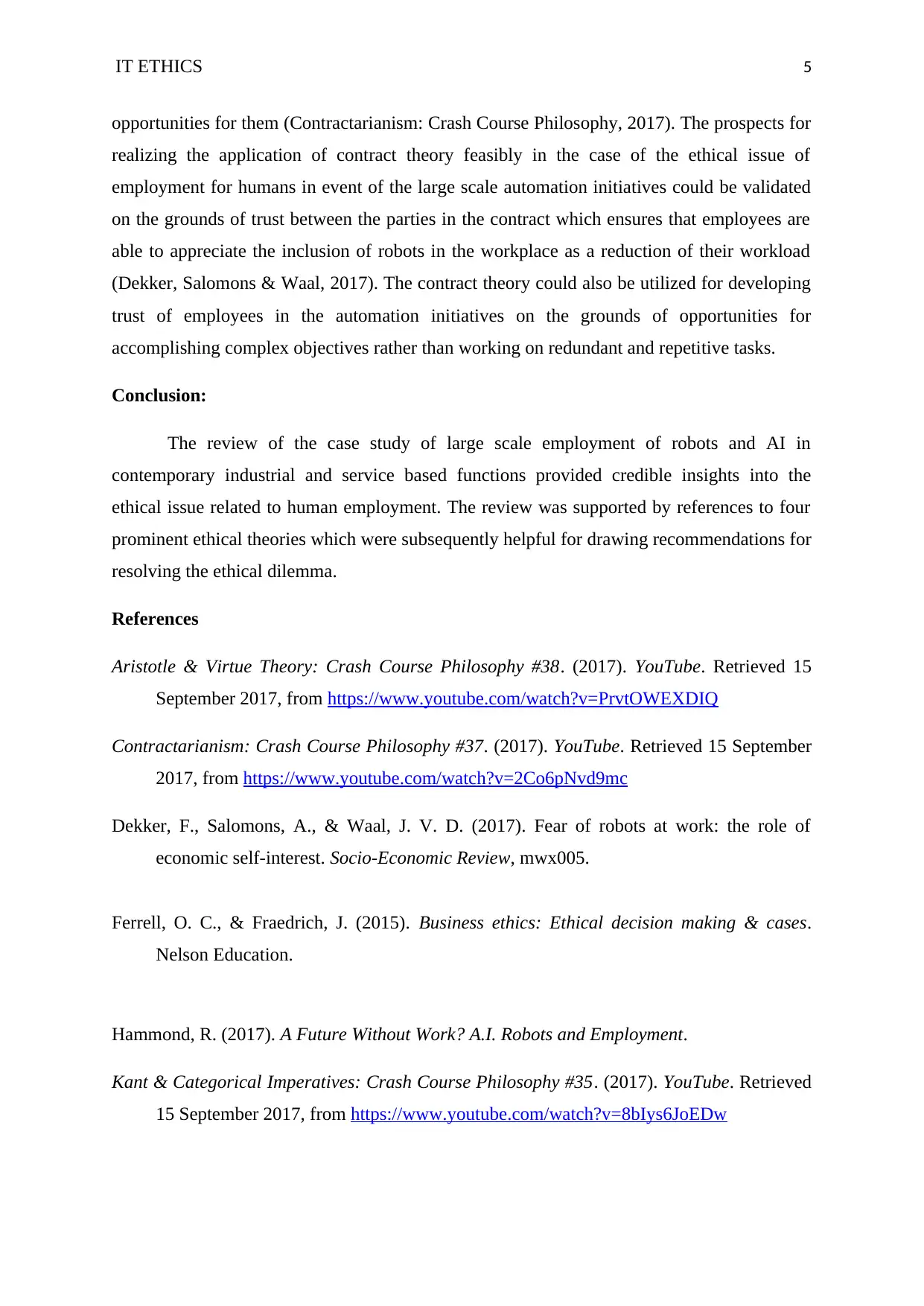
IT ETHICS 5
opportunities for them (Contractarianism: Crash Course Philosophy, 2017). The prospects for
realizing the application of contract theory feasibly in the case of the ethical issue of
employment for humans in event of the large scale automation initiatives could be validated
on the grounds of trust between the parties in the contract which ensures that employees are
able to appreciate the inclusion of robots in the workplace as a reduction of their workload
(Dekker, Salomons & Waal, 2017). The contract theory could also be utilized for developing
trust of employees in the automation initiatives on the grounds of opportunities for
accomplishing complex objectives rather than working on redundant and repetitive tasks.
Conclusion:
The review of the case study of large scale employment of robots and AI in
contemporary industrial and service based functions provided credible insights into the
ethical issue related to human employment. The review was supported by references to four
prominent ethical theories which were subsequently helpful for drawing recommendations for
resolving the ethical dilemma.
References
Aristotle & Virtue Theory: Crash Course Philosophy #38. (2017). YouTube. Retrieved 15
September 2017, from https://www.youtube.com/watch?v=PrvtOWEXDIQ
Contractarianism: Crash Course Philosophy #37. (2017). YouTube. Retrieved 15 September
2017, from https://www.youtube.com/watch?v=2Co6pNvd9mc
Dekker, F., Salomons, A., & Waal, J. V. D. (2017). Fear of robots at work: the role of
economic self-interest. Socio-Economic Review, mwx005.
Ferrell, O. C., & Fraedrich, J. (2015). Business ethics: Ethical decision making & cases.
Nelson Education.
Hammond, R. (2017). A Future Without Work? A.I. Robots and Employment.
Kant & Categorical Imperatives: Crash Course Philosophy #35. (2017). YouTube. Retrieved
15 September 2017, from https://www.youtube.com/watch?v=8bIys6JoEDw
opportunities for them (Contractarianism: Crash Course Philosophy, 2017). The prospects for
realizing the application of contract theory feasibly in the case of the ethical issue of
employment for humans in event of the large scale automation initiatives could be validated
on the grounds of trust between the parties in the contract which ensures that employees are
able to appreciate the inclusion of robots in the workplace as a reduction of their workload
(Dekker, Salomons & Waal, 2017). The contract theory could also be utilized for developing
trust of employees in the automation initiatives on the grounds of opportunities for
accomplishing complex objectives rather than working on redundant and repetitive tasks.
Conclusion:
The review of the case study of large scale employment of robots and AI in
contemporary industrial and service based functions provided credible insights into the
ethical issue related to human employment. The review was supported by references to four
prominent ethical theories which were subsequently helpful for drawing recommendations for
resolving the ethical dilemma.
References
Aristotle & Virtue Theory: Crash Course Philosophy #38. (2017). YouTube. Retrieved 15
September 2017, from https://www.youtube.com/watch?v=PrvtOWEXDIQ
Contractarianism: Crash Course Philosophy #37. (2017). YouTube. Retrieved 15 September
2017, from https://www.youtube.com/watch?v=2Co6pNvd9mc
Dekker, F., Salomons, A., & Waal, J. V. D. (2017). Fear of robots at work: the role of
economic self-interest. Socio-Economic Review, mwx005.
Ferrell, O. C., & Fraedrich, J. (2015). Business ethics: Ethical decision making & cases.
Nelson Education.
Hammond, R. (2017). A Future Without Work? A.I. Robots and Employment.
Kant & Categorical Imperatives: Crash Course Philosophy #35. (2017). YouTube. Retrieved
15 September 2017, from https://www.youtube.com/watch?v=8bIys6JoEDw
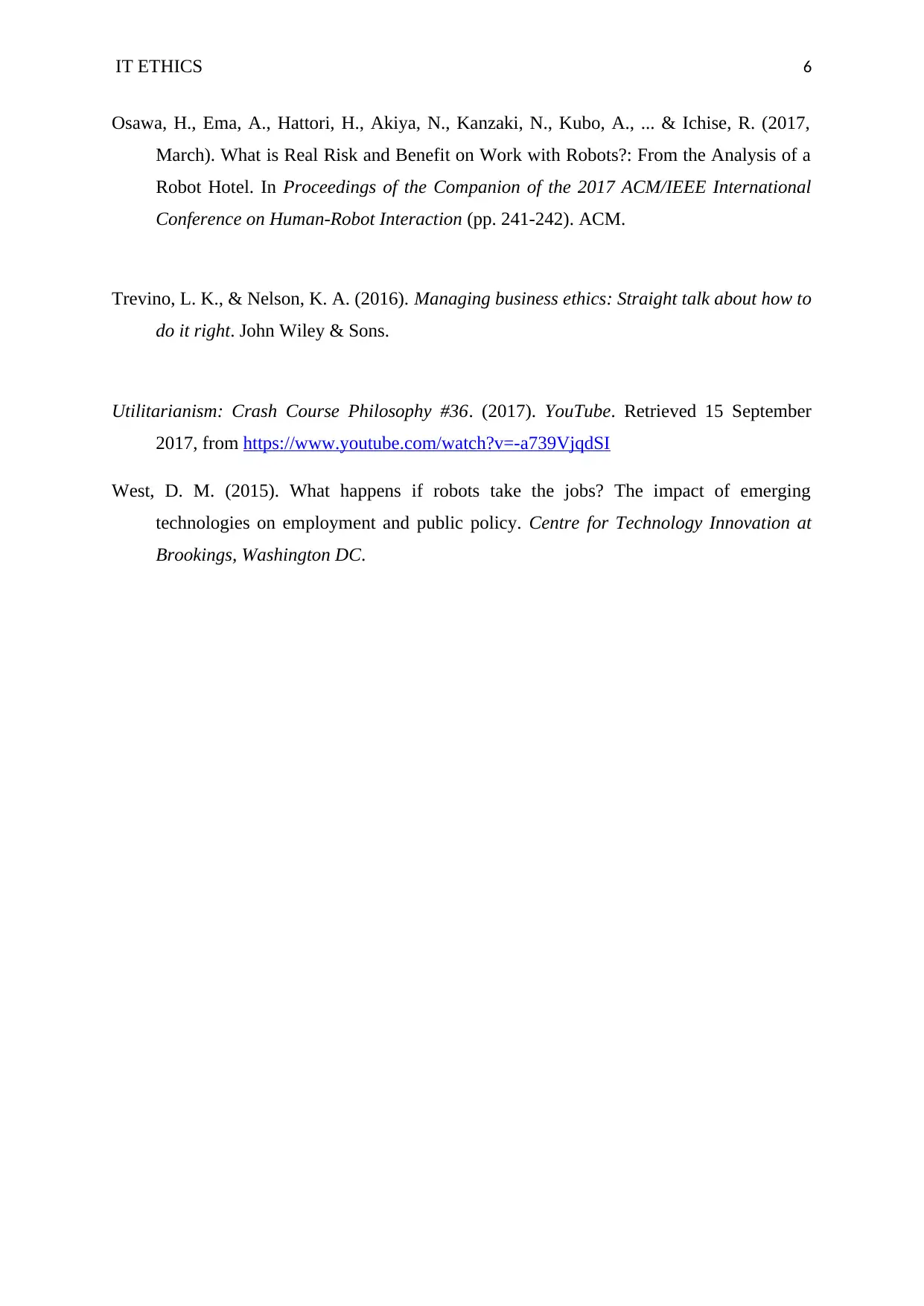
IT ETHICS 6
Osawa, H., Ema, A., Hattori, H., Akiya, N., Kanzaki, N., Kubo, A., ... & Ichise, R. (2017,
March). What is Real Risk and Benefit on Work with Robots?: From the Analysis of a
Robot Hotel. In Proceedings of the Companion of the 2017 ACM/IEEE International
Conference on Human-Robot Interaction (pp. 241-242). ACM.
Trevino, L. K., & Nelson, K. A. (2016). Managing business ethics: Straight talk about how to
do it right. John Wiley & Sons.
Utilitarianism: Crash Course Philosophy #36. (2017). YouTube. Retrieved 15 September
2017, from https://www.youtube.com/watch?v=-a739VjqdSI
West, D. M. (2015). What happens if robots take the jobs? The impact of emerging
technologies on employment and public policy. Centre for Technology Innovation at
Brookings, Washington DC.
Osawa, H., Ema, A., Hattori, H., Akiya, N., Kanzaki, N., Kubo, A., ... & Ichise, R. (2017,
March). What is Real Risk and Benefit on Work with Robots?: From the Analysis of a
Robot Hotel. In Proceedings of the Companion of the 2017 ACM/IEEE International
Conference on Human-Robot Interaction (pp. 241-242). ACM.
Trevino, L. K., & Nelson, K. A. (2016). Managing business ethics: Straight talk about how to
do it right. John Wiley & Sons.
Utilitarianism: Crash Course Philosophy #36. (2017). YouTube. Retrieved 15 September
2017, from https://www.youtube.com/watch?v=-a739VjqdSI
West, D. M. (2015). What happens if robots take the jobs? The impact of emerging
technologies on employment and public policy. Centre for Technology Innovation at
Brookings, Washington DC.
⊘ This is a preview!⊘
Do you want full access?
Subscribe today to unlock all pages.

Trusted by 1+ million students worldwide
1 out of 6
Related Documents
Your All-in-One AI-Powered Toolkit for Academic Success.
+13062052269
info@desklib.com
Available 24*7 on WhatsApp / Email
![[object Object]](/_next/static/media/star-bottom.7253800d.svg)
Unlock your academic potential
Copyright © 2020–2026 A2Z Services. All Rights Reserved. Developed and managed by ZUCOL.





